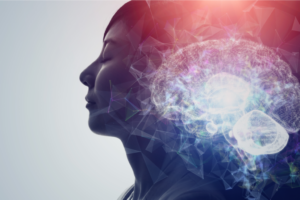Hormones Play a Leading Role in How You Feel


Written and verified by the psychologist Sharon Laura Capeluto
The human being is a complex system influenced, in turn, by many other systems. Systemic psychology views each of the institutions of which a person is a part as a system. For example, the family, the couple, the work team, the group of friends, etc. Furthermore, different systems are seen as coexisting in the body. For instance, the nervous, the digestive, the respiratory, and the endocrine, among others.
Therefore, the changes that occur are seen as the product of the interaction of systems. Indeed, everything that happens inside us influences what we do, feel, and think, and vice versa. In this article, we’ll focus on how hormones are related to emotions.
The endocrine system
The endocrine system is defined as the set of organs, glands, and tissues that secrete substances called hormones. Hormones are chemical messengers that modulate body functions.
They’re released into the bloodstream and travel to different organs and cells to regulate metabolism, growth, behavior, reproduction, sexuality, and also mood. As you can see, they play a more than significant role in your life, despite the fact that you’re generally unaware of the fact.
Hormones with the greatest influence on emotions
These chemicals condition how you act and how you feel emotionally. They can stimulate you, inhibit you, and make you feel happy, stressed, sad, or excited.
1. Dopamine
Dopamine is a molecule that acts as a neurotransmitter in the central nervous system. It plays an important role in psychological vectors, such as pleasure or motivation. On the other hand, it’s released in extremely large quantities at especially intense emotional moments. It’s also released in situations that are pleasurable and it urges you to repeat them.
Imagine that you really enjoy high-fat foods. In this case, dopamine strengthens the synapse that associates chocolate cake with the sensation of pleasure. This will make the chocolate cake become a reinforcement in itself. Thus, you’ll look for it indirectly, by earning money to be able to buy it, or directly, by buying it.
The excess of this hormone can generate a collateral effect because it’s linked to addictive behaviors such as drug use, the impulsive tendency to buy, eat unhealthy foods, or gamble. These behaviors or substances overstimulate the reward circuit that end up producing adverse effects, making you no longer feel as much pleasure.

2. Endorphins
Endorphins are protein chains made by your body that give you states of euphoria and well-being while reducing your perception of physical and emotional pain. For this reason, they’re called pain analgesics. Chemically, they’re similar to morphine and codeine in that they help reduce discomfort.
Endorphins are secreted when you laugh out loud, do intense physical exercise, have sex, listen to music, or eat foods that contain good fats such as dark chocolate, salmon, avocados, or nuts.
3. Cortisol
This is the stress hormone. The hypothalamus controls cortisol, which appears in tense or threatening events, to help you cope. It’s thanks to cortisol that you react adaptively to situations that could suggest a risk to your physical or emotional integrity.
Stress in certain doses and frequencies is positive because it allows you an extra dose of energy in a short period of time to guarantee your survival. It’s key to your daily activation: it helps you to be in an alert state to think, work, and move your body.
However, a problem occurs when cortisol is permanently secreted. In this case, you’ll probably end up developing insomnia, chronic stress, or an anxiety disorder. That’s because you’re on constant alert and it seems like you’re always running away from problems and worries.
4. Serotonin
Serotonin plays a really important role in the regulation of moods and humor. When the levels of this hormone increase, your body experiences satisfactory feelings of well-being. For this reason, many interventions to treat depression increase the levels of this hormone in the inter-synaptic spaces.
In turn, this hormone regulates the sleep cycle, digestion, and body temperature. It also inhibits aggressive behavior and impacts sexual desire. Cuddling a pet, exposing yourself to the sun, resting well, and practicing yoga or relaxation techniques are some of the activities that increase serotonin levels and make you feel happier.

5. Oxytocin
Oxytocin is an oligopeptide made up of nine amino acids that play an essential role in health and well-being. It’s released when you have contact with your loved ones. It increases feelings of love and trust in interpersonal bonds.
Oxytocin is the hormone that induces labor, as it stimulates the contractions of the uterus and helps to distend the cervix. It also lowers blood pressure and increases the pain tolerance threshold. In turn, it favors lactation, parental responsibility, and care.
This hormone is associated with empathy and reflecting on what happens to others. In contrast to cortisol, which makes you less empathic due to the high level of irritability, oxytocin helps you put yourself in the other person’s shoes.
Finally, it’s important to bear in mind that an emotional imbalance can often hide a hormonal imbalance. It can be treated by first going to a doctor who specializes in endocrinology. They can evaluate the condition of the hormones.
The human being is a complex system influenced, in turn, by many other systems. Systemic psychology views each of the institutions of which a person is a part as a system. For example, the family, the couple, the work team, the group of friends, etc. Furthermore, different systems are seen as coexisting in the body. For instance, the nervous, the digestive, the respiratory, and the endocrine, among others.
Therefore, the changes that occur are seen as the product of the interaction of systems. Indeed, everything that happens inside us influences what we do, feel, and think, and vice versa. In this article, we’ll focus on how hormones are related to emotions.
The endocrine system
The endocrine system is defined as the set of organs, glands, and tissues that secrete substances called hormones. Hormones are chemical messengers that modulate body functions.
They’re released into the bloodstream and travel to different organs and cells to regulate metabolism, growth, behavior, reproduction, sexuality, and also mood. As you can see, they play a more than significant role in your life, despite the fact that you’re generally unaware of the fact.
Hormones with the greatest influence on emotions
These chemicals condition how you act and how you feel emotionally. They can stimulate you, inhibit you, and make you feel happy, stressed, sad, or excited.
1. Dopamine
Dopamine is a molecule that acts as a neurotransmitter in the central nervous system. It plays an important role in psychological vectors, such as pleasure or motivation. On the other hand, it’s released in extremely large quantities at especially intense emotional moments. It’s also released in situations that are pleasurable and it urges you to repeat them.
Imagine that you really enjoy high-fat foods. In this case, dopamine strengthens the synapse that associates chocolate cake with the sensation of pleasure. This will make the chocolate cake become a reinforcement in itself. Thus, you’ll look for it indirectly, by earning money to be able to buy it, or directly, by buying it.
The excess of this hormone can generate a collateral effect because it’s linked to addictive behaviors such as drug use, the impulsive tendency to buy, eat unhealthy foods, or gamble. These behaviors or substances overstimulate the reward circuit that end up producing adverse effects, making you no longer feel as much pleasure.

2. Endorphins
Endorphins are protein chains made by your body that give you states of euphoria and well-being while reducing your perception of physical and emotional pain. For this reason, they’re called pain analgesics. Chemically, they’re similar to morphine and codeine in that they help reduce discomfort.
Endorphins are secreted when you laugh out loud, do intense physical exercise, have sex, listen to music, or eat foods that contain good fats such as dark chocolate, salmon, avocados, or nuts.
3. Cortisol
This is the stress hormone. The hypothalamus controls cortisol, which appears in tense or threatening events, to help you cope. It’s thanks to cortisol that you react adaptively to situations that could suggest a risk to your physical or emotional integrity.
Stress in certain doses and frequencies is positive because it allows you an extra dose of energy in a short period of time to guarantee your survival. It’s key to your daily activation: it helps you to be in an alert state to think, work, and move your body.
However, a problem occurs when cortisol is permanently secreted. In this case, you’ll probably end up developing insomnia, chronic stress, or an anxiety disorder. That’s because you’re on constant alert and it seems like you’re always running away from problems and worries.
4. Serotonin
Serotonin plays a really important role in the regulation of moods and humor. When the levels of this hormone increase, your body experiences satisfactory feelings of well-being. For this reason, many interventions to treat depression increase the levels of this hormone in the inter-synaptic spaces.
In turn, this hormone regulates the sleep cycle, digestion, and body temperature. It also inhibits aggressive behavior and impacts sexual desire. Cuddling a pet, exposing yourself to the sun, resting well, and practicing yoga or relaxation techniques are some of the activities that increase serotonin levels and make you feel happier.

5. Oxytocin
Oxytocin is an oligopeptide made up of nine amino acids that play an essential role in health and well-being. It’s released when you have contact with your loved ones. It increases feelings of love and trust in interpersonal bonds.
Oxytocin is the hormone that induces labor, as it stimulates the contractions of the uterus and helps to distend the cervix. It also lowers blood pressure and increases the pain tolerance threshold. In turn, it favors lactation, parental responsibility, and care.
This hormone is associated with empathy and reflecting on what happens to others. In contrast to cortisol, which makes you less empathic due to the high level of irritability, oxytocin helps you put yourself in the other person’s shoes.
Finally, it’s important to bear in mind that an emotional imbalance can often hide a hormonal imbalance. It can be treated by first going to a doctor who specializes in endocrinology. They can evaluate the condition of the hormones.
All cited sources were thoroughly reviewed by our team to ensure their quality, reliability, currency, and validity. The bibliography of this article was considered reliable and of academic or scientific accuracy.
- Duerler, P., Vollenweider, F. X., & Preller, K. H. (2022). A neurobiological perspective on social influence: Serotonin and social adaptation. Journal of Neurochemistry.
- Molina, Á. L. G., Velásquez, A. A. R., & Molina, J. F. G. (2012). La hormona oxitocina: neurofilosofía de la vida social y emocional del ser humano. Uni-pluriversidad, 12(3), 101-106.
- Paxinos, G. y Mai, J. (2004). The human nervous system. Academic Press, Inc.
- Rohn, J. (2021). Las hormonas de la felicidad como aliadas del cuidado emocional. URemotion.
- Valdés, M., & De Flores, T. (1985). Psicobiología del estrés. Barcelona: Martínez Roca, 2.
This text is provided for informational purposes only and does not replace consultation with a professional. If in doubt, consult your specialist.







